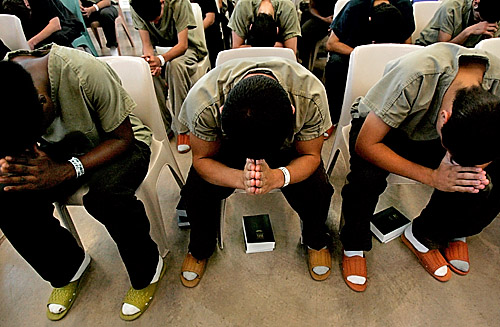Judges Experimenting with Less Punitive Approach in Juvenile Cases
During a recent debate between several candidates vying for the Republican presidential nomination, the moderator asked a question about the death penalty. When he pointed out that Texas Governor Rick Perry had presided over a very large number of executions, the audience burst into spontaneous applause.
Although public support for the death penalty is (very slowly) declining, a solid majority of Americans still support capital punishment. I’m going to go ahead and give the audience members the benefit of the doubt, and assume that they were not cheering out of bloodlust, but a belief that these executions represent a triumph of good over evil, law and order over criminality.
 Anyway, most Americans consider themselves “law and order” types: in general, we believe that criminals should be punished, and punished harshly. We also pride ourselves on having a fair legal system, which gives most criminals at least one chance to prove that they’ve been rehabilitated.
Anyway, most Americans consider themselves “law and order” types: in general, we believe that criminals should be punished, and punished harshly. We also pride ourselves on having a fair legal system, which gives most criminals at least one chance to prove that they’ve been rehabilitated.
However, the United States still has a fairly high recidivism rate for major criminals.
This fact has led to some judges experimenting with less punitive ways of dealing with crime, focusing instead on rehabilitation. This is becoming especially appealing when dealing with juvenile offenders, because most experts think that, the younger an offender is, the better their chances of being rehabilitated, if a serious effort is made.
The chief judge of New York State is seeking to completely overhaul the juvenile justice system for exactly that reason. The proposal involves transferring the jurisdiction over cases involving less serious crimes committed by teenagers to the state’s family court system. Unlike the criminal justice system, civil courts (including family law courts) usually have a much wider range of options when it comes to dealing with remedying legal wrongs that have been committed. His plan would make sure that more serious and violent offenders continue to be prosecuted as adults.
I’ve said before that the penal system, especially with respect to how it handles juvenile offenders, needs to be reformed.
The criminal justice system has, for generations, focused largely on punishment. This may appeal to our baser natures, but it may not be the most effective means of preventing crime. For example, after police arrested the perpetrator of the tragic bombing and mass shooting in Norway last July, news reports quickly began to gravitate towards the punishment that he is likely to face. They reported that many prisons in Norway resemble summer camps and college dorms more than correctional facilities. In the United States, and many other countries with more “traditional” prison systems, people who learned about this expressed confusion and outrage. This was compounded by the fact that Norway doesn’t even have life imprisonment as an option, let alone the death penalty. However, prison authorities do have the option to keep someone locked away indefinitely, if they’re deemed to still pose a threat to society, with reviews conducted every few years to make that determination.
However, Norway has a recidivism rate that’s far, far lower than that of the United States, with far fewer criminals re-offending after they’re released, despite the fact that their prisons seem luxurious by our standards.
This is largely believed to be caused by the fact that Norway’s prison system focuses heavily on rehabilitation, investing in psychological treatment and job training. Obviously, if the underlying cause of a person’s crime was mental illness and/or financial desperation (as is often the case), both of these measures would prevent people from re-offending.
While it may not have the same emotional appeal as punishing criminals just for the sake of punishing them, it seems to be better for society.
Adopting a similar system in the United States, quite frankly, isn’t going to happen anytime soon. First of all, the vast majority of criminal justice functions are handled by individual states. And while there are basic constitutional standards that, in theory, govern prison conditions, there’s a huge variation between individual states in philosophies about how criminals should be treated.
However, I think we should all be able to agree that juvenile offenders, should, with a few exceptions for the most violent and obviously-incorrigible offenders, be rehabilitated as opposed to simply locked away and forgotten.
However, a single judge in New York cannot do this alone. While he may be able to help set up a pilot program, to prove to policymakers that such a system can work, it will ultimately be up to state legislatures to create such a system, and, just as importantly, to fund it.
But with government budgets being cut across the board, it’s unlikely that wholesale reform of our juvenile justice system is likely to happen anytime soon.

Comments